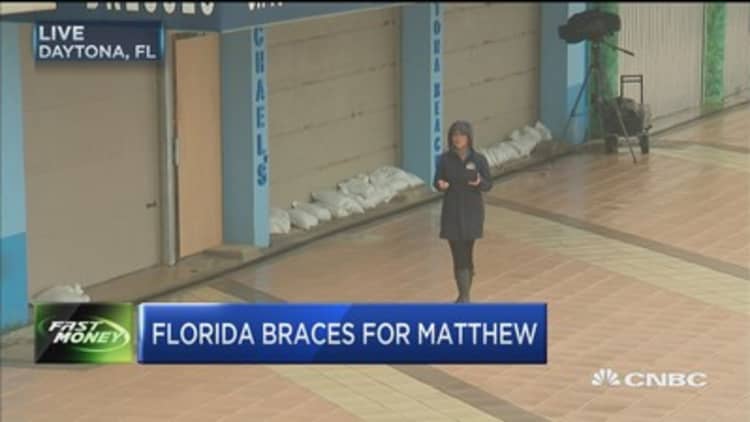
Hurricane Matthew could potentially help Hillary Clinton's presidential campaign by pausing political media coverage at a time when the Democratic candidate maintains a slight lead in polls, experts said Thursday.
The storm, which is projected to make landfall in Florida as a Category 4 hurricane, could be one of the most destructive events for the state in recent memory. The state's governor, Rick Scott, implored residents and visitors on Thursday to evacuate all affected areas, and the White House has already announced it has teams prepared to respond.
Such a "potentially catastrophic" event — as Scott deemed it Thursday — will likely affect many lives, but it could also play a role in the upcoming presidential contest between Clinton and Republican Donald Trump.
"The unknown aspect of how this will turnout provides a lot of possibilities," said GOP consultant Matt Mackowiak. "But the thing I'm most certain about is that (the storm) will freeze the race where it is — at a pretty stable 3- to 4-point lead for Clinton."
In effect, the hurricane will likely dominate the news for several days, running down the clock at a time when most metrics indicate Clinton is winning. The media blackout could be especially relevant in Florida, which is the state most likely to tip the election, according to FiveThirtyEight's prediction model.
Clinton averaged a 2.4-point lead over Trump in recent four-way Florida polls, which include Green Party nominee Jill Stein and Libertarian Party nominee Gary Johnson, Real Clear Politics said Thursday.
"For the vast majority of people who live here, nobody is going to be fixated on this campaign for a few days," said Steve Schale, a Florida-based Democratic strategist who directed the state's Obama campaign in 2008.
The media's attention had already begun to pull away from politics before the storm even made U.S. landfall: Around midday Thursday, the top 12 links on right-of-center website Drudge Report were all about Hurricane Matthew.
Although it hasn't yet made landfall, the storm has already seen its first entry into the political world: When word broke the Clinton campaign had purchased $63,000 worth of advertising time in several Florida markets from Thursday to Monday, Republican National Committee Chairman Reince Priebus tweeted "Couldn't let this crisis go to waste? Shameful @HillaryClinton's campaign even considered exploiting Hurricane Matthew for political gain."
The Clinton campaign said in a statement that those ad buys have been delayed until after the hurricane passes.
Katie Packer, a GOP strategist and former deputy campaign manager for Mitt Romney's 2012 presidential run, said candidates will have to walk a fine line if they're considering advertising around a hurricane.
"I think that could be a mistake if (Clinton) is running ads that are overtly political," Packer said. "But if she's purchased ads as a public service announcement and it's seen to be sensitive that could be a plus."
As for actually visiting the affected regions, Packer recommended both campaigns stay away.
"If I were working for either candidate I'd keep them a million miles away from the hurricane zone because I don't think either of them is very good at empathy — so the potential for a misstep is high."
When Hurricane Sandy devastated parts of the U.S. East Coast, Packer and other members of Romney's team ultimately decided not to bring the Republican candidate to the affected region.
Part of that decision was reportedly humanitarian as Secret Service requirements can take away resources from the relief effort, but those motivations didn't necessarily help Romney in his contest against President Barack Obama.
"The president was able to come in and look very presidential, and we were stuck doing nothing because anything else would have looked very political," Packer said.
But this time is different, Packer said, explaining that neither candidate has a defined role to play during a disaster like Obama did in 2012. The storm is also coming four weeks before Election Day — as opposed to Sandy's dissipating four days before polls opened — so attentions may well have turned elsewhere by the time ballots are cast.
Schale cautioned against predicting too great a political effect from the storm.
"It's not one of those events where this is happening the first week in November and is really going to affect turnout models," he said. "The most important thing for both campaigns is to be respectful and keep politics to a minimum."
Whatever memory does remain of the event, however, could be good for Clinton, according to Mackowiak: Obama, who has few immediate battles or trips on his schedule, will likely lead a strong response to the storm, and that will go over well with voters. And with his approval rating at a high mark for his second term, Obama has never been a more positive surrogate for Clinton.
"The attention will go back to Obama from Clinton and Trump, and that's on net not favorable for Trump, putting the outgoing president who is fairly popular right now back on television screens," Mackowiak explained.
That said, Clinton's association with the administration could cut both ways if the federal response to the storm is seen as unsuccessful.


